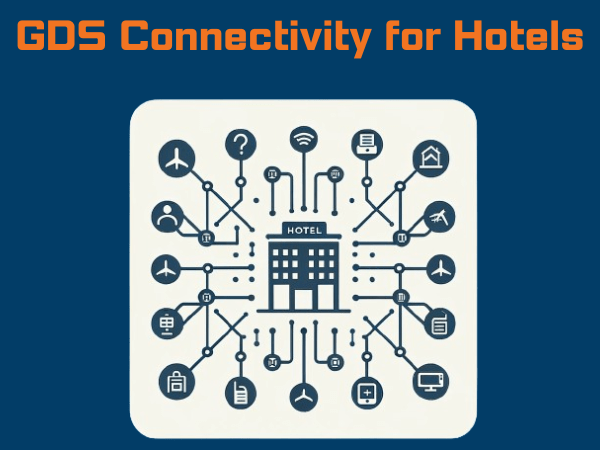In the fast-paced and ever-evolving hospitality industry, staying connected and visible is crucial. This is where Global Distribution Systems (GDS) come into play, acting as the backbone of worldwide travel distribution.
For hotels, GDS connectivity is not just a luxury; rather it’s a necessity in today’s digital age.
In this article, we explore the concept of GDS, its connectivity, and the pivotal role it plays in the success of hotels.
Table of Contents
- What are Global Distribution Systems (GDS)?
- Benefits of GDS Connectivity for Hotels
- 1. Increased visibility and reach
- 2. Efficient distribution of hotel inventory
- 3. Real-time updates and availability
- 4. Streamlined reservation process
- 5. Integration with hotel management systems
- 6. Targeted marketing
- 7. Enhanced competitive edge
- 8. Data insights and trends analysis
- 9. Strengthened travel agent relationships
- Frequently Asked Questions
- Conclusion
Let’s get going.
What are Global Distribution Systems (GDS)?
A Global Distribution System (GDS) is a network that enables transactions between travel industry service providers, mainly airlines, hotels, and car rental companies, and travel agencies.
It’s a powerful tool that transmits hotel room rates and inventory to travel professionals and customers, facilitating the booking process.
Initially developed for airline reservations, GDSs like Amadeus and Sabre have evolved to become key players in the wider travel and hospitality industry.
What is GDS connectivity?
GDS connectivity refers to the integration of a hotel’s property management system with a Global Distribution System.
This connection allows hotels to distribute their inventory across multiple online channels, including travel agencies and online booking platforms.
Benefits of GDS Connectivity for Hotels
The importance of GDS connectivity for hotels cannot be overstated. It offers a myriad of benefits that significantly impact a hotel’s operations and bottom line.

Here are some of the key benefits:
1. Increased visibility and reach
GDS connectivity provides hotels with a global platform, reaching millions of travel agents and potential guests worldwide.
According to statistics, in 2020, the global distribution system handled about 670 million hotel bookings worldwide.
Stratoflow
This increased visibility translates into more bookings and higher occupancy rates.
2. Efficient distribution of hotel inventory
GDS connectivity allows hotels to distribute their inventory efficiently across multiple channels.
This means that hotels can maximize their occupancy and revenue by ensuring that every room is sold at the right time, to the right guest, at the right price.
3. Real-time updates and availability
With GDS connectivity, hotels can provide real-time updates on room availability, rates, and special offers.
This not only enhances the guest experience but also reduces the risk of overbooking and other booking errors.
4. Streamlined reservation process
GDS connectivity streamlines the reservation process by providing a single platform for managing all bookings.
This simplifies the booking process for both the hotel and the guest, leading to improved guest satisfaction and loyalty.
5. Integration with hotel management systems
GDS connectivity can be seamlessly integrated with a hotel’s property management system, creating a centralized system for managing bookings, inventory, and guest data.
This integration leads to improved operational efficiency and reduced administrative costs.
#OnResTips: Did you know that OnRes provides GDS connectivity integrated with its PMS and other hotel management systems for your seamless operations.
6. Targeted marketing
GDS networks offer targeted marketing opportunities.
Hotels can position themselves strategically to appeal to specific market segments, such as business travelers or luxury vacationers, based on the GDS channel used.
7. Enhanced competitive edge
In a competitive industry, GDS connectivity gives hotels an edge. It allows smaller hotels to compete with larger chains by providing the same level of global exposure.
8. Data insights and trends analysis
GDS systems also offer valuable data insights.
Hotels can track booking trends, traveler preferences, and market dynamics, enabling them to make informed decisions about pricing and marketing strategies.
9. Strengthened travel agent relationships
GDS connectivity strengthens relationships with travel agents.
It facilitates seamless transactions and bookings, leading to better cooperation and opportunities for preferential partnerships or promotions.
Frequently Asked Questions
Conclusion
GDS connectivity is a powerful tool that can significantly enhance a hotel’s operations and profitability. By leveraging the power of the Global Distribution System, hotels can reach a global audience, manage their inventory efficiently, provide real-time updates, streamline the reservation process, and integrate seamlessly with their hotel management systems.
The importance of GDS connectivity for hotels is evident, and it’s a tool that every hotel should consider integrating into their operations.
